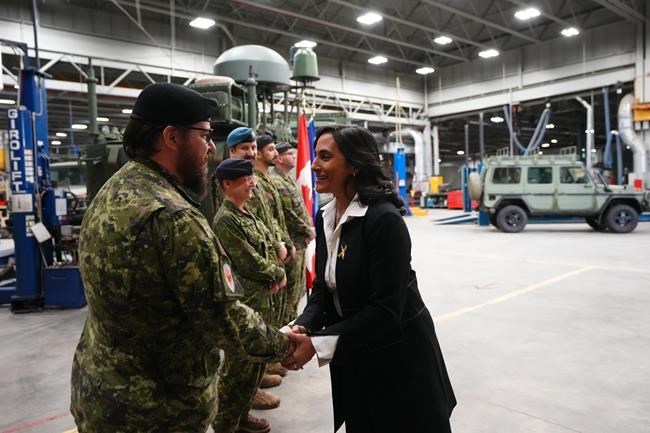OTTAWA — Defence Minister Anita Anand has promised to fast-track the delivery of new anti-tank, anti-aircraft and anti-drone weapons to Canadian soldiers in Europe, as Ottawa moves to address several glaring gaps in Canada's military capabilities.
Anand presented the plan to senior military officers, foreign delegates, industry representatives and academics at a major defence conference on Thursday, where panellists discussed the state and future of Canada's Armed Forces.
The presentations included a stark assessment of the military's personnel crisis by its top human resources officer, who revealed that the Canadian Armed Forces is short 16,000 service members — far more than has been previously reported.
"These are real, serious risks to mission success," Maj.-Gen. Lise Bourgon said. "And this is where the CAF finds itself."
Canada's troubled military procurement system also figured prominently, as Anand announced the Liberal government was turning to a mechanism not used since Afghanistan to deliver the new firepower to Canadian soldiers in Latvia.
Anand kicked off the Conference of Defence Associations Institute event by praising Ukraine's defence against Russia's invasion last year while touting the numerous investments that the Liberal government is making into Canada's military.
Those include new F-35 fighter jets, a fleet of new naval warships, and the modernization of North America's defensive systems.
"But we know that there are several crucial capabilities that we need to move ahead with faster," she said.
"Canada's largest foreign military deployment, as I'm sure you know, is on NATO's eastern flank in Latvia. And our troops there must have the equipment that they need to protect themselves and to do their jobs, especially at this crucial time."
Canada has about 700 troops in Latvia leading a NATO battle group designed to help defend eastern Europe from Russian attack. The battle group is poised to expand, however, and Canada has promised to provide certain new weapons.
Those include anti-tank, anti-aircraft and anti-drone systems, none of which the Canadian military currently has.
While the Armed Forces would almost certainly have faced a long wait going through a normal procurement, Anand said the government was declaring the weapons "urgent operational requirements" to get them to Latvia faster.
As Anand was plugging those holes in the military, Bourgon was pointing at 16,000 others, each representing a vacant position in the regular and reserve forces.
And the shortfall is set to worsen, as Bourgon told attendees that the military is failing to meet its recruitment targets by about 25 per cent, while "the rate of attrition is higher than it's ever been."
To address the problem, the military has launched a new advertising campaign aimed at getting Canadians into recruiting centres. It also recently opened the doors to permanent residents, all in a drive to get more people into uniform.
However, Bourgon admitted in reference to the military's challenge: "We need them a lot more today than they need us."
Russia and the personnel shortage weren't the only threats hovering over Thursday's conference as Anand described China as "an increasingly disruptive power" while noting Canada's growing reliance on its military for natural disasters.
It was in this context that Anand launched public consultations to inform the government as it revisits its defence policy, which was released in 2017 with an aim to guide investments in the military over the next 20 years.
"It is critically important that we get this right, which is why we have been engaging stakeholders across Canada, as well as our allies and partners, to inform our way forward," Anand said.
The review will look at five critical areas, including how to address the personnel shortage, upgrade Arctic defences, and determine exactly what equipment and capabilities are needed for modern conflict.
However, Anand did not speak to the degree to which cost will figure into the government's thinking, as critical military procurement projects continue to experience delays and cost overruns.
The Liberals are also facing new cost pressures on various non-military files amid growing calls to rein in spending after years of budgetary deficits, which predated the COVID-19 pandemic.
Attendees also heard from Wendy Gilmour, the assistant secretary-general of defence investment at NATO, that allies will be under even greater pressure in the coming years to shore up their militaries in the face of growing geopolitical instability.
This report by The Canadian Press was first published March 9, 2023.
Lee Berthiaume, The Canadian Press



